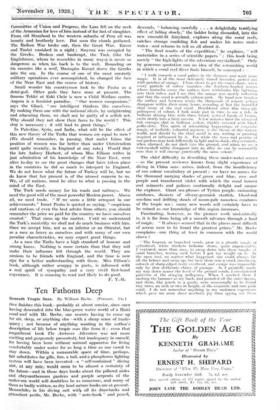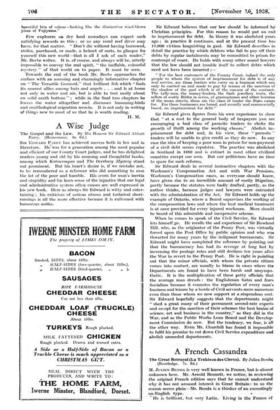Ten Fathoms Deep
Beneath Tropic Seas. By William Beebe. (Putnam. 158.) ONE finishes this book—probably at about sunrise, since once having descended into the blue-green water world of a Haiti coral reef with Mr. Beebe, one resents having to come up for air, sleep, or anything else—with a sharp sense of inade- quacy; not heeause of anything wanting in the author's description Of life below tropic sea.s (far from it ; even that magnificent book The Arcturus Adventure was not more exciting and gorgeously presented), but inadequacy in oneself, for having been born without natural apparatus for living comfortably under water for as long a time as one cared to stay down. Within a measurable space of tithe, perhaps, fair substitutes for gills, fin, a tail, and a phosphorus lighting System will have been invented—a " self-contained " diving suit, at any rate, would seem to be almost a certainty of the future—and in those days books about the pillared aisles and chrysanthemum gardens and purple serpents of the under-sea world will doubtless be as numerous, and many of them as badly written, as dry land nature books are at present. Meanwhile, in his diving suit with, all its drawbacks and attendant perils, Mr. Beebe, with "note-book" and pencil, descends, balancing. carefully• a delightfnlly terrifying effect of falling slowly," the ladder being discarded, into the new emerald-lit fairyland,. ,explores along the coral reefs; catches strange confiding fish and makes his notes under water—and returns to tell us, all about it. "The final results of the expedition," he explains, "will materialize in a series of scientific papers " ; this book being merely "the high-lights of the adventure crystallized." Only by generous quotation can an idea of the astonishing world in which a coral reef diver finds himself, be conveyed walk towards a coral palace in the distance and work more magic. It is of the most delicately tinted lavender, picked out with patches of orange. 1 lean closer to get the exact shade, n lien every particle of colour vanishes—the feathery-headed worms whose tentacles cover the surface have withdrawn like lightning into their tubes, and I see that the orange was merely retieetion and that the coral is actually salmon-pink. My hand now brushes the surface and between' winks the thousands of minute polyps disappear within their stony home, revealing at *last the beautiful clear ivory of the real coral. Bewildered after this three-ply palimpsest of colour, I look aside just in time to see a fish, in brilliant shining blue with three broad, vertical bands of brown, swim slowly into a fairy cavern. A few minutes later the identical fish emerges clad in brilliant yellow, thickly covered with black polka-dots. This spirit of astonishing happenings, of exquisite magic, of ineffable, colourful mystery, is the theme of this watery world, and should be the chief motif in any writing or painting inspired or influenced by it. For while the roses and peonies of our gardens may look differently in light and in shade, they certainly, when alarmed, do not dash into the ground, and .when we see a tortoiseshell tabby disappear into an alley we can be reasonably sure that it will emerge practically the same colour."
The chief difficulty in describing these under-water scenes —as the present reviewer knows from slight experience of diving in China seas—arises, indeed, from the 'insufficiency of our colour vocabulary at present : we have no names for the thousand merging shades of green and blue, rose and purple* and translucent violet with which the coral towers and minarets and palaces continually delight and amaze the explorer. Giant sea-plumes of Tyrian purple, swimming rainbows, showers of silvery-greenish starfish, blood-red sea-fans and drifting shoals of moon-pale nameless creatures of the tropic sea, : many new words will certainly have to be coined as our knowledge of this region increases.
Fascinating, however, as the pioneer work undoubtedly is, it is far from being all a smooth advance through a land of magic. " It always seemed that in the places most difficult of aceess were to be found the greatest prizes." Mr. Beebe complains—one thing at least in common with the world above !
" The Isopora, or branched corals, grew in a ghostly tangle of cylindrical, white thickets fathoms down, -quite impenetrab!e. I ventured, more than once, to creep down into these tangles of coral branches, testing each before I put my weight on it. ln the open roof, no matter what happened, one could always lift off the helmet and swim up, but here there was a cruel, interlaced, cobweb of sharp-edged ivory overhead, and escape was impossible only by slow deliberate choice of passage. As I painfully made my way down nearer the level of the ground corals, 1 encountered portiOres of the stinging millepores. When 1 reached there I unslung the hammer at my back, and pounded off the outer layers, and there, like jewels in a geode, wore occasionally to be found tiny trees, an inch or two in height, of the exquisite and rare pink coral. I do not remember anything in my undersea experience which gave me more sheer aesthetic joy than spying out these beautiful bits of colour—looking Tate the diminutive Wind-blown pines of Fujiyama."
Few explorers on dry land nowadays eau expect such satisfying rewards as This; or as any coral reef diver may have, for that matter. -" Don't die without having borrowed, stolen, purchased, or made, a helmet of sorts, to glimpse for yourself this new world—that is all i ask of each reader," Mr. Beebe writes. It is, of course, and always will be, utterly impossible to convey the real spirit, "the ineffable, colourful mystery" of that world on to paper. It must be seen.
Towards the end of the book Mr. Beebe approaches the surface with an amusing and charmingly informative chapter on "The Versatile Gurnard," that brilliant fish which "finds its nearest allies among bats and angels . . . and is at home not only in water and air, but is able to trot easily about on solid earth bottom " ; while in the final two chapters he leaves the water altogether and discusses humming-birds and ornithological migration secrets. It is not only in writing of things new to most of us that he is worth reading.
H. M.













































 Previous page
Previous page